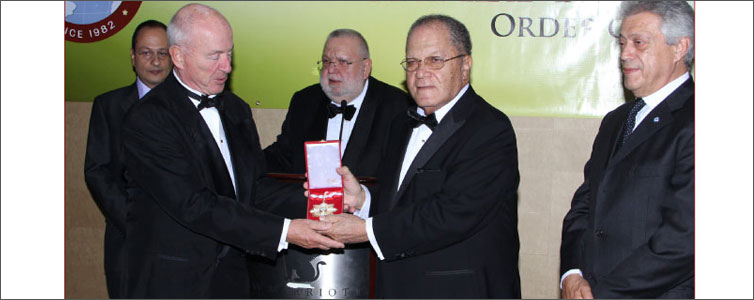On behalf of the Board of Directors of the World Federation of Consuls, it gives me great pleasure to welcome you all here this evening to our banquet to honour Dr. Michael Nobel.
On 24th April, 1963, the United Nations Conference on Consular Relations adopted and opened for signature, the Vienna Convention on Consular Relations, the Optional Protocol concerning acquisition of nationality and the Optional Protocol concerning the compulsory settlement of disputes.
On 24th April, 2013, The World Federation of Consuls congratulated the United Nations and its member states on the attainment by the Vienna Convention on Consular Relations of its Golden Jubilee.
To mark the occasion of the 50th Anniversary of the Vienna Convention on Consular Relations, a reception was held by our Federation at the Turkish Centre, opposite the United Nations, at which over 100 countries were represented.
The guest list was headed by H. E. Mr. Vuk Jeremic, President of the General Assembly of the United Nations. The Secretary General H. E. Ban Ki-moon, sent his apologies for not being able to attend due to a previous engagement.
It is important to note that our Federation is the only NGO to publicly congratulate the United Nations on its achievement.
The Board of Directors of our Federation decided to mark the occasion by honouring 5 outstanding citizens of the world and I am pleased to announce that Dr. Michael Nobel was the first world citizen chosen. Dr. Nobel will receive the FICAC Order of Merit, the commemorative medal marking the 50th Anniversary of the Vienna Convention on Consular Relations.
While the origin of the Consular institution can be traced back to ancient Greece, it was not until the 12th century that the first figure of the Consul emerged and developed to its present and more complex structure. The extraordinary increase of Consulates during the 19th and 20th centuries revealed the need for a precise legal framework specific to the Consular service and the legal status of Consuls.
The Vienna Convention on Consular Relations 1963 recognized that Honorary Consuls that had been extensively utilized in the past, constituted an efficient instrument in enhancing international relations. Later on, changes in social, political and economic activity created a new challenge for the Consular institution; the protection of citizens and the safeguard of their interest.
The World Federation of Consuls was established in Copenhagen in October 1982 as the Federation Internationale des Corps et Associations Consulaires, abbreviated as FICAC. FICAC was born out of the necessity to bring together Consular Corps and Consular Associations to share experiences and to coordinate efforts to enhance the effectiveness and status of the Consul. Our Federation is incorporated in Belgium by Royal Decree as a nonprofit international organization with its Permanent Secretariat located in Brussels.
The Federation’s business is conducted through several committees, each operating with clearly defined portfolios and terms of reference. Our Board of Directors meets quarterly to evaluate action by the committees and take decisions on their recommendations, in accordance with mandates and policies agreed by the General Assembly at our Triennial World Congress.
Our Federation enjoys United Nations recognition as an NGO with ECOSOC Status. We have similar recognition at the European Union, and we are also recognized by the Organization of American States.
The World Federation of Consuls has achieved international recognition, credibility and influence. Today, our Federation has over 90 country members, associations and affiliated members with several thousand individual Consul members. Our membership is a network of highly experienced, well connected individuals, whose determined focus, combined expertise and resources can be used to impact the world for good.
The practice of mutual respect and adherence to the principals recognized in the Vienna Convention on Consular Relations 1963 will continue to guide the promotion of Consular cooperation in each member country.
We have undertaken an extensive programme, to congratulate and thank the United Nations, and celebrate the 50th Anniversary of the Vienna Convention on Consular Relations, which involves all our members in every region of the world.
Ladies and Gentlemen, on behalf of the Directors and members of our Federation, I would like to again welcome you and thank you for being with us tonight and sincerely hope you will enjoy the evening.
Thank you.
